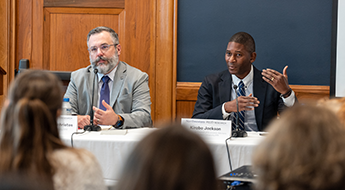Kirabo Jackson
Abraham Harris Professor of Education and Social Policy | Professor of Economics
PhD, Economics, Harvard University, 2007
Kirabo Jackson is the Abraham Harris Professor of Human Development and Social Policy and a Professor of Economics at Northwestern University. He earned his bachelor’s degree in ethics, politics, and economics from Yale University in 1998 and completed his doctorate in economics at Harvard University in 2007. He began his academic career as an assistant professor of labor economics at Cornell University (2007–2010) before moving to Northwestern University.
As a labor economist specializing in education and social policy, Jackson’s research has been influential in many areas. He is best known for his work demonstrating the long-term impact of public school funding on student outcomes, developing innovative methods to evaluate educational interventions beyond standardized test scores, and exploring how teachers and teacher labor markets shape student success. His research has been published in leading economics journals and supported by major organizations, including the National Science Foundation, the Spencer Foundation, the Carnegie Corporation of New York, the Smith Richardson Foundation, and the Gates Foundation.
Jackson served as co-editor of the Journal of Human Resources from 2014 to 2019 and subsequently joined the American Economic Journal: Economic Policy as co-editor, later becoming editor-in-chief in 2022. He was appointed by President Biden as one of the three members of the White House Council of Economic Advisors, serving from July 2023 to October 2024.
His contributions to policy analysis were recognized with the David N. Kershaw Award and Prize from the Association for Public Policy Analysis and Management (APPAM) in 2020. That same year, he was elected to the National Academy of Education. In 2022, he was elected to the American Academy of Arts and Sciences for his excellence and leadership in education policy.
Current Research
The Effect of Teachers on Measures of Socio-Emotional Skills: Jackson extends the traditional test-score value-added model of teacher quality to allow for the possibility that teachers affect a variety of student outcomes through their effects on both students’ cognitive and noncognitive skill. In published work, Jackson shows that teachers have effects on skills not measured by test scores, but reflected in absences, suspensions, course grades, and on-time grade progression. Teacher effects on these non-test-score outcomes in 9th grade predict effects on high-school completion and predictors of college-going—above and beyond their effects on test scores. Relative to using only test-score measures of teacher quality, including both test-score and non-test-score measures more than doubles the predictable variability of teacher effects on these longer-run outcomes. In ongoing work, Jackson examines how teacher effects on these behavior-based measures of soft skills relate to effects on photometric measures of soft skills. He will also examine which teacher practices predict these effects and will look at longer-run outcomes such as postsecondary completion and labor market outcomes.
The Effect of Single-Sex Education on Test Scores, School Completion, Arrests, and Teen Motherhood: Existing studies on single-sex schooling suffer from biases due to the fact that students who attend single-sex schools differ in unmeasured ways from those who do not. Moreover, even if one can deal with the student selection problem, schools that are single sex may differ from coeducational schools in systematic unobserved ways (other than being single sex). In 2010, the Ministry of Education in Trinidad and Tobago converted 20 low-performing secondary schools from coeducational to single-sex. Jackson exploits these conversions to identify the causal effect of single-sex schooling holding other school inputs constant. After also accounting for student selection, single-sex cohorts at conversion schools score higher on national exams and are four percentage points more likely to complete secondary school. There are also important non-academic effects: All-boys cohorts have fewer arrests as teens, and all-girls cohorts have lower teen pregnancy rates. These benefits are achieved at zero financial cost. Survey evidence suggests that these single-sex effects reflect both direct gender peer effects due to interactions between classmates, and indirect effects generated through changes in teacher behavior.
The Long-Run Effect of Head Start and Public School Spending: Jackson and Berkeley economist Rucker Johnson examine the long-run effects of Head Start on the outcomes of poor children. They pay particular attention to whether the effects of Head Start differ for those who attend better resourced public schools. Using the Panel Study of Income Dynamics, they compare the adult outcomes of cohorts who were differentially exposed to policy-induced changes in preschool (Head Start) spending and school-finance-reform-induced changes in public school spending during childhood, depending on place and year of birth. Difference-in-difference instrumental variables and sibling-difference estimates indicate that, for poor children, increases in Head Start spending and increases in public K–12 spending each individually increased educational attainment and earnings, and reduced the likelihood of both poverty and incarceration in adulthood. The benefits of Head Start spending were larger when followed by access to better-funded public K–12 schools, and the increases in K–12 spending were more efficacious for poor children who were exposed to higher levels of Head Start spending during their preschool years. The findings suggest that early investments in the skills of disadvantaged children that are followed by sustained educational investments over time can effectively break the cycle of poverty.
Selected Publications
Jackson, C. K. and C. Mackevicius. 2024. What impacts can we expect from school spending policy? Evidence from evaluations in the U.S. American Economic Journal: Applied Economics.
Beuermann, D., C. K. Jackson, L. Navarro-Sola, and F. Pardo. 2023. What is a good school, and can parents tell? Evidence on the multidimensionality of school output. The Review of Economic Studies 90(1): 65–101.
Beuermann, D. and C. K. Jackson. 2022. The short and long-run effects of attending the schools that parents prefer. Journal of Human Resources 57(3): 725–46.
Jackson, C. K. 2021. Can introducing single-sex education into low-performing schools improve academics, arrests, and teen motherhood? Journal of Human Resources 56(1): 1–39.
Jackson, C. K., C. Wigger, and H. Xiong. 2020. Do school spending cuts matter? Evidence from the Great Recession. American Economic Journal: Economic Policy 13(2): 304–35.
Jackson, C. K., S. Porter, J. Easton, A. Blanchard, and S. Kiguel. 2020. School effects on socio-emotional development, school-based arrests, and educational attainment. American Economic Review: Insights 2(4): 491–508.
Johnson, R. C. and C. K. Jackson. 2019. Reducing inequality through dynamic complementarity: Evidence from Head Start and public school spending. American Economic Journal: Economic Policy 11(4): 310–49.
Jackson, C. K. 2018. What do test scores miss? The importance of teacher effects on non-test-score outcomes. Journal of Political Economy 126(5): 2072–107.
Jackson, C. K. 2017. Can online off-the-shelf lessons improve student outcomes? Evidence from a field experiment. American Economic Journal: Economic Policy 10(3): 226–54.
Jackson, C. K., R. Johnson, and C. Persico. 2016. The effects on school spending on educational and economic outcomes: Evidence from school finance reforms. The Quarterly Journal of Economics 131(1): 157–218.


